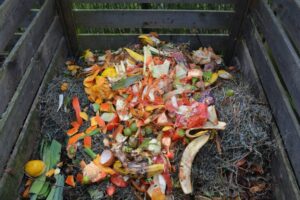We need to stop wasting food. I’ve spent that last couple of years as a volunteer Ambassador for Waste Savvy Staffs in a programme run by Garden Organic on behalf of Staffordshire County Council, England.
 It’s been a really interesting experience. I’ve given talks about waste reduction to a range of organisations – including Soroptimists – on how households can reduce their waste and manage it better; and one of the quickest wins, and one which will have a major impact is eliminating food waste.
It’s been a really interesting experience. I’ve given talks about waste reduction to a range of organisations – including Soroptimists – on how households can reduce their waste and manage it better; and one of the quickest wins, and one which will have a major impact is eliminating food waste.
Some hard facts…
- More than one third of the food produced globally goes to waste.
- Inside the average general waste bin in the UK, 29% is food waste, despite the fact that 8.4 million people here are in food poverty.
- Food waste mainly ends up in landfill where it generates large quantities of methane as it breaks down. Methane is 25x more harmful than carbon dioxide to the environment.
- There’s also the moral and economic dimension to wasting good food here when millions around the world are under-fed.
- In the UK 69% of of food waste comes from households – that’s 7.1 million tonnes per year – which would fill Wembley Stadium 9 times over! So we can make a real difference as individuals and households.
- According to WRAP, each year the average household wastes around £700 in food.
- The most frequently wasted items in the UK are salads, bread, milk, potatoes, cheese, ham, bananas and apples.
- 24 million slices of bread go to waste every day from UK homes. If we piled this up it would go up the world’s highest mountain Mount Everest 23 times!
Types of Food Waste
There are several types of food waste, each needing a slightly different approach:
- By-product food waste. Solid and liquid food by-products created through the production process or agriculture. This could include peels and trimmings from fruit & veg.
- Expired products. Products past their sell-by date and which cannot be consumed.
- Leftovers. Uneaten food in households or within the restaurant and food preparation sectors.
- Baked goods and packaged food waste. Unsold food items that could spoil quickly.
How can we stop wasting food?
Plan meals and don’t buy more than you know you’ll use. If you do, cook it and freeze it.
Understand food labelling:
- Use the “sniff test” and other sensory cues – The Food Standards Agency has some great advice here.
- Ignore Sell By dates, they are for the retailer. Food close to or on its Sell By Date is often cheaper so that’s a win for you!
- Use By dates are “sacrosanct” of course, but you can use food ON its Use By date. Don’t use the “sniff test” on foods past their Use By date.
Lobby providers to avoid unnecessary expiry dates and packaging – some progress is being made here.
 Turn down your fridge temperature setting to below 5 degrees C.
Turn down your fridge temperature setting to below 5 degrees C.
Use local sharing apps such as Olio and Too Good To Go or contribute to your local community fridge.
Work with your close neighbours – why not start a WhatsApp Group and offer out unused food?
Freeze food getting close to its Use By date. You can freeze most food items, even fruit, though you may need to change how you ultimately use it of course (though who doesn’t love banana bread?!). More on the basics of freezing can be found on the Food Standards Agency website.
Avoid plastic packaging and if you can’t, remove it when you get home. Adding a piece of kitchen roll to a bagged salad will increase its life for example.
Try “whole food eating”. Potato skins, apple peel, cauliflower leaves, cabbage hearts, carrot tops and ends of leeks and onions are just some of the things that end up in the bin when they could be served up on your plate.
And if you still have some food waste…
Inevitably there will be some material left…so recycle your food waste by turning it into nutrient rich compost for your garden, window boxes or pots.
 Dalek, wormery, or Bokashi Bin – there’s a home composting solution for every situation including a Green Cone which is purely a waste digester – perfect for the non-gardener!
Dalek, wormery, or Bokashi Bin – there’s a home composting solution for every situation including a Green Cone which is purely a waste digester – perfect for the non-gardener!
If you want to know more – get in touch at enquiries@silichfield.org.uk

